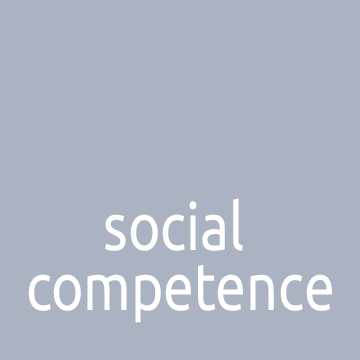


non medical practitioner
systemic therapist
SFBT focussing attempt
mediator
wellbeing facilitator
couple therapist
team coach
Montessori teacher
paramedic
medical nurse

Communication and Arguing
In todays climate of communication it is not easy to learn to argue in an adequate and safe manner. We encounter such words as "conflict competence", "conflict culture", "communication" and "social competence" daily, and yet we don't always strive to uphold their virtues. In times like these it sometimes appears impossible to hark back to experience or emulate the behaviour of role models.
Learning to argue
Arguing correctly must be learned - but how?
- Recognize situations of conflict and be able to reflect your own behaviour during a conflict
- Be aware of your own interests, wishes and needs and be able to communicate them clearly
- Listen actively and register the meaning behind another person's words
- Respect the inner world and workings of another person, without relinquishing your own
- Ask supporting questions in order to facilitate a positive communication climate and to encourage comprehension
- Deal constructively with accusations and assignments of guilt and dare to address delicate topics
- Voice and accept criticism, without getting into a fight over it
- Negotiate in a solution orientated manner which benefits all parties
Arguing correctly must be learned - but how?
 page Print
page Print
In todays climate of communication it is not easy to learn to argue in an adequate and safe manner. We encounter such words as "conflict competence", "conflict culture", "communication" and "social competence" daily, and yet we don't always strive to uphold their virtues. In times like these it sometimes appears impossible to hark back to experience or emulate the behaviour of role models.
Learning to argue
Arguing correctly must be learned - but how?
- Recognize situations of conflict and be able to reflect your own behaviour during a conflict
- Be aware of your own interests, wishes and needs and be able to communicate them clearly
- Listen actively and register the meaning behind another person's words
- Respect the inner world and workings of another person, without relinquishing your own
- Ask supporting questions in order to facilitate a positive communication climate and to encourage comprehension
- Deal constructively with accusations and assignments of guilt and dare to address delicate topics
- Voice and accept criticism, without getting into a fight over it
- Negotiate in a solution orientated manner which benefits all parties
Arguing correctly must be learned - but how?
 page Print
page Print
The Ten Commandments of Fair Fighting
1. You must not blindside!
Two people are required for arguing - and if one party is just not up for a fight right now, they are completely within their right to declare this and suggest another time to discuss the matter further.
2. You must make use of your right to withdraw!
If you are feeling the heat of the moment, withdraw for a short while to calm down or achieve inner clarification of the problem
3. You must not want to win!
In a fair argument, there are no winners and losers, but two winners: whoever wants to come out 'on top' is not able to argue fairly.
4. You must discover what the problem is!
The first step is self-clarification. What happened? What feelings has that stirred in me? What do I think about it all? What do I need? What would I like?
5. You must only talk with regards to yourself!
He who talks about their own feelings, needs and wishes will be able to explain their inner world without hurting or accusing the other person.
6. You must not accuse and never again say "always"!
Allegations, insults, lectures, accusations, generalizations and ranting are forbidden.
7. You must listen!
You must not interrupt. Someone else talking is your chance to learn something about their point of view. You may inquire - you may not interrogate.
8. You must not rush!
Conflict resolution is about giving each other time and listening properly to what both people have to say. Premature or hasty 'solutions' generally do not deliver on their promises.
9. You must let the other person be different!
Everyone has a right to their own way of thinking, wanting, feeling and acting. No one has the right to want to change someone else just because they are different.
10. You must want to find a solution!
Whoever wants to find a solution must negotiate eye to eye. Who needs how much of what for what purpose?
(from the book "Streiten will gelernt sein - Die kleine Schule der fairen Kommunikation" by Simone Pöhlmann and Angela Roethe )
1. You must not blindside!
Two people are required for arguing - and if one party is just not up for a fight right now, they are completely within their right to declare this and suggest another time to discuss the matter further.
2. You must make use of your right to withdraw!
If you are feeling the heat of the moment, withdraw for a short while to calm down or achieve inner clarification of the problem
3. You must not want to win!
In a fair argument, there are no winners and losers, but two winners: whoever wants to come out 'on top' is not able to argue fairly.
4. You must discover what the problem is!
The first step is self-clarification. What happened? What feelings has that stirred in me? What do I think about it all? What do I need? What would I like?
5. You must only talk with regards to yourself!
He who talks about their own feelings, needs and wishes will be able to explain their inner world without hurting or accusing the other person.
6. You must not accuse and never again say "always"!
Allegations, insults, lectures, accusations, generalizations and ranting are forbidden.
7. You must listen!
You must not interrupt. Someone else talking is your chance to learn something about their point of view. You may inquire - you may not interrogate.
8. You must not rush!
Conflict resolution is about giving each other time and listening properly to what both people have to say. Premature or hasty 'solutions' generally do not deliver on their promises.
9. You must let the other person be different!
Everyone has a right to their own way of thinking, wanting, feeling and acting. No one has the right to want to change someone else just because they are different.
10. You must want to find a solution!
Whoever wants to find a solution must negotiate eye to eye. Who needs how much of what for what purpose?
(from the book "Streiten will gelernt sein - Die kleine Schule der fairen Kommunikation" by Simone Pöhlmann and Angela Roethe )
